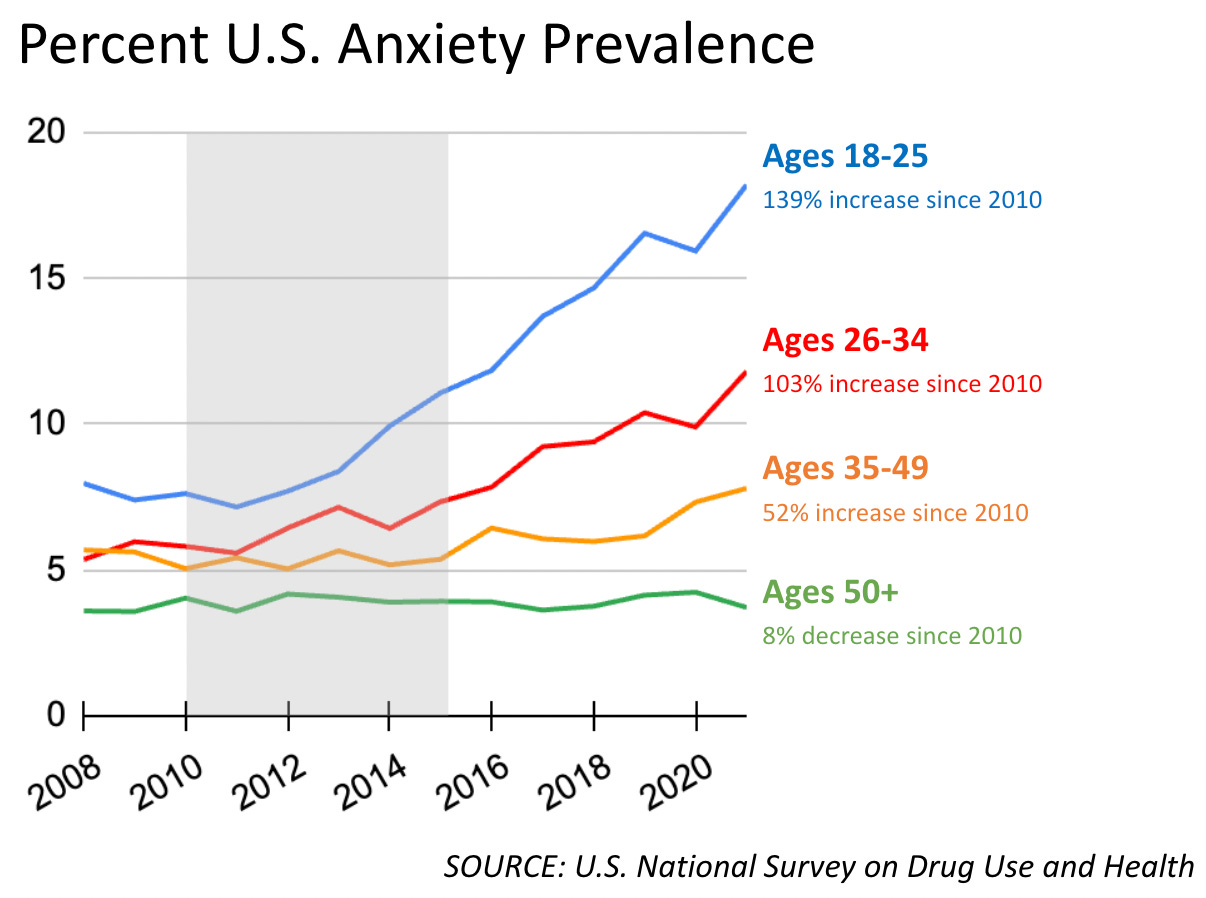About the After Babel Substack
Welcome to the After Babel Substack. I’m a social psychologist who studies morality, and I’m a professor in the Business and Society Program at New York University’s Stern School of Business. (My bio and mission statement are here. My name is pronounced “height.”) Now, what is this Substack about?
The Babel Project
The story of Babel is the best metaphor I’ve found for making sense of the momentous sociological, cultural, and epistemological changes that occurred in many nations in the early 2010s, which gave us the chaos, fragmentation, and outrage that began to set in by the mid-2010s. There are many causes of the transformation, but I believe that the largest single cause was the rapid conversion, after 2009, of the early “social networking systems,” which made it easy for people to communicate with others, into “social media platforms,” upon which people stand and perform in pursuit of publicly quantified prestige and influence. There was a sudden increase in shouting and a decline in listening. There was a loss of shared stories, shared meanings, and human relationships.
Pondering that loss reminded me ofGenesis 11 when the descendants of Noah arrive at the plain of Shinar. They decide to build a city with a tower whose top shall reach the heavens. God is not pleased by their hubris and says:
Look, they are one people, and they have all one language; and this is only the beginning of what they will do; nothing that they propose to do will now be impossible for them. Come, let us go down, and confuse their language there, so that they will not understand one another’s speech.
Imagine what that would be like—to feel that humanity was on top of the world one moment, with grand achievements and limitless possibilities. And then, from out of nowhere, you find that everything you built together has crumbled, and you can’t even talk together or work together to restore it.

As a college professor who loves universities, this is exactly what it felt like to me in 2015, as Greg Lukianoff and I described in our 2015 Atlantic article The Coddling of the American Mind, and in far more detail in our 2018 book with the same title. Greg and I documented a series of psychological changes in students who were born after 1995 (now known as Gen Z). We showed how this anxious new generation arrived on campus and demanded new norms, procedures, and bureaucratic responses that are incompatible with the older truth-seeking culture of universities. We showed how the witch-hunts, moral panics, and “vindictive protectiveness” of the new movement (which included some administrators and professors) were only made possible by the hyper-viral dynamics of social media.
Now, in 2023, we have ample evidence that the changes we first observed on campus in 2014 have not been confined to campus. (Or, asAndrew Sullivan observed in 2018: “We all live on campus now.”) But the transformation of society in the 2010s was not caused by anxious college students. They were simply the “canaries in the coal mine” — the first generation whose social lives have moved onto smartphones and social media platforms. As soon as they did so, in the early 2010s, an epidemic of mental illness began.
In addition to studying how adolescent mental health changed in the 2010s, I have been studying how liberal democracies changed too, as they moved their information sources and public squares onto platforms such as Twitter, Facebook, and Youtube. They too began to decline, as I’ll show in later posts.
This is what the After Babel Substack is about: it’s my effort to think through, in public, the profound psychological and sociological changes that occurred in the 2010s when human social and political life migrated onto platforms curated by a few for-profit companies whose business models drove them to maximize engagement.
The Two Books
In 2021 I had a sabbatical year during which I planned to write a long-delayed book Three Stories about Capitalism: The Moral Psychology of Economic Life. I began working on the early chapters, but my mind kept returning to the question, “What the hell is happening to us? Why does everything seem to be going haywire?” I kept outlining articles I wanted to write to answer the question, and in August 2021 I pitched the idea of a series of eight essays to Don Peck, my editor at The Atlantic (who deserves a lot of the credit for making the original Coddling essay a hit.) Don consulted with Jeff Goldberg, the Atlantic’s editor-in-chief, who came back with the wise advice: don’t write eight essays; write one big one. So that’s what I set out to do, and that’s the essay that I published in The Atlantic in April 2022 titled Why the Past Ten Years of American Life Have been Uniquely Stupid.
As soon as I started writing that essay it became clear that I’d need a book to tell the whole story, so I wrote a book proposal and my agent, Brockman Inc, sold the rights to Penguin Press, which published The Coddling. The title of the new book will be After Babel: Adapting to a World We Can No Longer Share. (You can see a precis of the book here.) I had planned to start the book with one chapter on what happened to Gen Z, but by the time I had written a chapter merely documenting the epidemic of depression, anxiety, self-harm, and suicide, it became clear that I’d need a whole book to tell that story too. So I pitched that idea to Virginia Smith, my editor at Penguin Press (who deserves a lot of the credit for making the Coddling book a hit), and she agreed. I then split the Babel book in two, and the first book is titled The Anxious Generation: How The Great Rewiring of Childhood is Causing an Epidemic of Mental Illness. (You can pre-order the book now.)
The Babel Project is my effort to write two books in two years on the changes wrought by the phone-based life on human development (The Anxious Generation) and liberal democracy (Life After Babel). I had initially planned to hide away and maximize my time writing, and I thought that starting a Substack would be a distraction from that goal. But Clyde Rathbone at Substack showed me that I could use the platform in very flexible ways. I could make this Substack an adjunct to my writing, where I could share findings, theories, and questions while inviting the kind of criticism that I’d rather get before I submit the manuscripts than after each book is published. Plus, I am so alarmed by the speed of the changes—particularly to children’s mental health—that I want to get these findings out now, in early 2023, rather than waiting until March 2024 (the publication date of The Anxious Generation).
So, welcome to the After Babel Substack. I hope to tell you about some of my major findings as I find them. I will solicit feedback, alternative interpretations, and criticism along the way. I’ll also share with you summaries of some of the best things I read. I hope you will offer comments on the posts, although I must apologize in advance: The only way I can ever find time to write is when I cut way back on correspondence. I will read all of the comments on each post, but I simply won’t be able to respond to individual comments or engage in dialogue, either on the site or by email. Thanks for understanding.
Some of the main things I’ll be sharing are a series of collaborative review documents I’m creating with Zach Rausch, my lead researcher for both books. These are large Google docs where we organize the abstracts of all the published research articles we can find on the major empirical questions I'm trying to answer as I write the two books. The first two docs, which were posted in 2019, and which Zach and I curate with Jean Twenge (author of iGen, and Generations), are:
Adolescent mood disorders since 2010: A collaborative review. This document lays out the basic findings and graphs about how teen mental health has changed since 2010.
Social Media and Mental Health: A Collaborative Review. This document lays out all the research linking social media to the large increases in mood disorders, self-harm, and suicide shown in the first document. We seek out evidence on both sides.
In 2021 I worked with sociologist Chris Bail (author of Breaking the Social Media Prism) to produce an analogous document for the democracy question, titled:
Social Media and Political Dysfunction: A Collaborative Review. This document organizes the empirical evidence on seven pathways by which social media may be weakening liberal democracy.
We have a number of other review docs on various pieces of the puzzle, including documents on play research, what’s happening to boys, video games, dating apps, and international trends.
About Paid Subscriptions
I really like the Substack model, which allows writers to reach audiences directly and make a living doing so. I’m in a different position from most authors: I don’t need the money. I have a well-paid and secure day job (tenured professor), and I earn money from public speaking and book royalties. I am also a professor of business ethics who lectures MBA students about the dangers of conflicts of interest. I have watched as some professors whose work has anything to do with the culture war are pulled away from professionalism by what is sometimes called “audience capture.” That is, if you write more inflammatory stuff and then find that it attracts more subscribers and earns you more money immediately, then by basic operant conditioning, your behavior will be pulled toward a more inflammatory style. I want to keep myself free from this process, so my original intention was to make everything free and offer no paid subscriptions. But Clyde at Substack pointed out to me that some readers want to take out a paid subscription to show support for me and my work. I’m grateful for such support.
I realized that there’s an elegant solution: I ask subscribers to consider upgrading to a paid subscription not to gain access to more material but in order to support the three non-profit organizations that I founded in order to address the multiple crises of the post-Babel era. Here they are:
1) Heterodox Academy, which I co-founded in September 2015 as a faculty project to advocate for more viewpoint diversity, especially political diversity, among the professoriate. Our mission is “to improve the quality of research and education in universities by increasing open inquiry, viewpoint diversity, and constructive disagreement.”
2) Let Grow, which I co-founded with Lenore Skenazy, Daniel Shuchman, and Peter Gray, in 2017, to address the loss of childhood play and independence that turns out to be the crucial backstory in The Anxious Generation. Our mission is “to make it easy, normal and legal to give kids the independence they need to grow into capable, confident, and happy adults.”
3) The Constructive Dialogue Institute, which I co-founded with Caroline Mehl in 2017, in the wake of the polarizing 2016 presidential election. (It was originally called OpenMind.) Our mission is “to translate the latest behavioral science research into educational tools that are evidence-based, practical, and scalable in order to equip students and professionals with the skills for constructive dialogue.”
If you want to support me and my work, please support any of these four organizations directly by making a donation OR upgrade to a paid subscription here ($50/year), or give someone else a gift subscription. In January of each year, I’ll show the Substack/Stripe documentation I received about paid subscriptions, and I'll show how I divided the money among the three organizations, minus any direct costs for running the Substack. (I may revise this policy after the first year, once I understand the Substack world better and see how much work it takes to run this Substack.)
Everything I write will be available to all subscribers; there will be no paywall. The one benefit I intend to offer to paid subscribers is access to two group Zoom calls per year. Only paid subscribers will receive the invitations. In those sessions, I’ll express my gratitude, give an update on what I’m working on and how the reform efforts are going, and I’ll answer any questions.
Welcome, and thanks for joining me on this journey to figure out what is happening to teen mental health and to liberal democracy. If you like what you find here, please recommend it to friends.
Let’s get started. Let’s figure out how to make the post-Babel world better.
— Jon Haidt
Major Posts
Social Media is a Major Cause of the Mental Illness Epidemic in Teen Girls. Here’s the Evidence.
Here are 13 Other Explanations For The Adolescent Mental Health Crisis. None of them Work. (By Jean Twenge)
The Teen Mental Illness Epidemic Is International, Part 1: The Anglosphere. (By Zach and me)
Why the Mental Health of Liberal Girls Sank First and Fastest
Play Deprivation is a Major Cause of the Teen Mental Health Crisis. (By Peter Gray)
Algorithms Hijacked My Generation. I Fear For Gen Alpha. (By Freya India)




